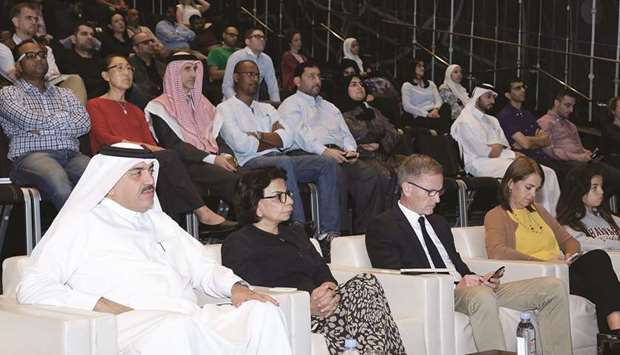Global warming, climate changes and their effects are the topics that concern everyone on the planet. Though the world leaders are busy in working out how to deal with the man influenced problem, the significance of every individual’s efforts towards combating the issue cannot be undermined.
The environmentalists have long been underlining the need for increased awareness among the people about the global warming. Understanding the scale of the problem well is a key to its solution.
Earth Talks is a series addressing the challenges of climate change through education and awareness in Qatar. The talk has regularly been held by Arab Youth Climate Movement Qatar (AYCM Qatar), an independent, non-profit, non-government organisation in Qatar.
AYCM recently organised the talks at Qatar National Library (QNL) where Dr Rajendra Kumar Pachauri, Chief Mentor of Protect Our Planet (POP) Movement and President of World Sustainable Development Forum, spoke on the occasion.
He is also the former chairperson of UN’s Intergovernmental Panel for Climate Change and the panel won the Nobel Peace Prize during his tenure in 2007).
The event was also attended by HE Mohamed bin Abdullah al-Rumaihi and as many as seven ambassadors of different countries along with a large number of people.
Dr Pachauri discussed the urgency of climate action, upcoming Conference of Parties No 24 (COP24), taking place in Poland from December 3 to 12, and the latest IPCC Special Report on Global Warming of 1.5C. With the help of his slide presentations, he spoke at length on the topic of ‘Science of Climate Change – Policies and Actions by all Stakeholders.’
In his keynote message, he said, “Human influence on the climate system is clear. The more we disrupt our climate, the more we risk severe, pervasive, and irreversible impacts. We have the means to limit the climate change and build a more prosperous and sustainable future.”
With the help of graphic presentations, Dr Pachauri noted, “It is extremely likely that we (human) are the dominant cause of global warming since the mid-20th Century. Some of the changes in the extreme weather and climate events observed since about 1950 have been linked to the human influence. The impacts are already underway on both poles, on all continents and oceans, affecting both the rich and the poor countries alike.”
The expert further said, “Continued emissions of greenhouse gases will cause further warming and changes in the climate system. Oceans will continue to warm during the 21st century and the sea level will continue to rise. It is very likely that the Arctic sea ice cover will continue to shrink and thin as surface temperature rises. Global glacier volume will further decrease.”
Speaking about the potential impacts, the expert said, “There will be food and water shortage, increased displacement of people, poverty will increase, and there will be more coastal flooding.”Regarding what needs to be done, he said, “There is a need to limit temperature increase to 2 degree. The global emission of greenhouse gases should be reduced 40 to 70 percent in 2050 when compared to 2010. There needs to be net zero or negative greenhouse gases emission in 2100 with global emission to be curbed in next five to 15 years.”
He further added, “The mitigating measures include more efficient use of energy, greater use of low-carbon energy, reduction in deforestation, planting of new forests, use of bio-energy with carbon capture and storage, and change in lifestyle.”
He added, “Time is running out. Human activities are estimated to have caused approximately 1.0 degree of global warming above pre-industrial levels, with a likely range of 0.80C to 1.20C. Global warming is likely to reach 1.50C between 2030 and 2052 if it continues to increase at the current rate.”
Talking to Community, Neeshad V S, Executive Director of AYCM Qatar, said, “Over the past few months, Earth Talks has gained a reputation for attracting leading scientists, thinkers and activists from all over the world to Qatar. This talk was organised in collaboration with QNL and Global Shapers Doha Hub.” He added, “An ecologically conscious society is critical for the human survival and understanding our relationship with natural ecosystem will help us to protect it and nurture it. AYCM Qatar aims to address this issue through organising lectures, eco trips, capacity building and programmes that will push our boundaries of ecological knowledge.”

AUDIENCE: HE Mohamed bin Abdullah al-Rumaihi along with the ambassadors of various embassies during the event.
